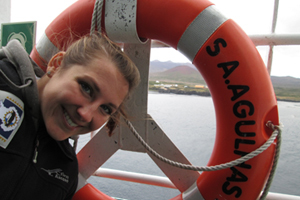Co-badged degree offers oceanographer a French connection
08 May 2014 | Story by Newsroom
Oceanography intern Katherine Hutchinson, a member of the all-woman UCT oceanography research team aboard the SA Agulhas II during its April expedition to the Prince Edwards Islands, took a somewhat unusual route to graduate with a co-badged master's degree.
It was Katherine Hutchinson's surfer dad who inspired her love of the ocean, particularly the Atlantic seaboard in Cape Town where she grew up.
"I was always around the sea," recalls the master's graduate in physical oceanography, a co-badged qualification she earned from UCT and l'Universite de Bretagne Occidentale (Brest University), France.
Co-badged qualifications are rare, but reflect the increasingly collaborative and multidisciplinary aspects of postgraduate study, particularly North-South links. Candidates like Hutchinson have co-supervisors and enjoy the experience of life and academia from new vantage points, drawing from the expertise of the partner institutions.
Studying the effects climate change on the world's oceans, Hutchinson says she benefited hugely from her 'twin' academic homes.
After completing her BSc (environmental science and oceanography) at UCT in 2010, Hutchinson was offered a place on a three-month trip south to Antarctica aboard the SA Agulhas.
It was a life-changing journey.
Her subsequent honours project investigated changes in the Southern Ocean circumnavigating Antarctica. While her research interest remained on the Southern Ocean, her master's degree later took her along a different academic path: a co-badged qualification, based on her studies of alterations in heat and salt in the Antarctic Circumpolar Current south of Africa over the past 20 years.
Northern marine focus
Linking with Brest University was a coup. The institution is part of France's biggest marine science centre, hosts the European University Marine Institute (IUEM), and has hundreds of postgraduate students in physical oceanography and allied marine fields.
Hutchinson initially spent three months in Brest, UBO's home town, funded by the International Centre for Education, Marine and Atmospheric Sciences over Africa's (ICEMASA) co-badged degree programme. ICEMASA is a joint venture between several laboratories in South Africa and France and focuses on the marine sciences along the Southern African coasts and the Southern Ocean.
Studying through UCT and Brest University also meant she could combine her twin interests: the sea and everything French. She loved the language, had studied it at school, and had always dreamed of doing a "séjour" in France.
She returned to France for another four months in 2013, thanks to UCT travel funding and a top-up bursary from SAMOC (South Atlantic Meridional Overturning Circulation).
French connections
"The oceanographic research lab in Brest was very supportive of my research and even agreed to fund my attendance of the International Association for the Physical Sciences of the Oceans conference in Sweden in July 2013 to present my master's research."
That Hutchinson was able to graduate with a co-badged degree is thanks to links formalised in 2011 when a UCT delegation and representatives of the French Institute of Research for Development based at UCT, Drs Steven Herbette and Francis Marsac, visited France.
As a result, UCT signed memoranda of understanding with Brest University and then very recently with University of Montpellier for Science and Technology, encompassing staff and student exchanges '“ and also co-badged degrees in marine science.
Academic staff and student exchanges in the marine field are facilitated through UCT's multidisciplinary Check out the full Marine Research Institute (Ma-re).
Story by Helen Swingler. Image supplied.
 This work is licensed under a Creative Commons Attribution-NoDerivatives 4.0 International License.
This work is licensed under a Creative Commons Attribution-NoDerivatives 4.0 International License.
Please view the republishing articles page for more information.










